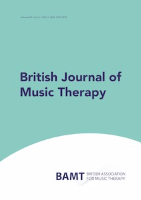
British Journal of Music Therapy
Scope & Guideline
Enhancing well-being through melodic interventions.
Introduction
Aims and Scopes
- Interdisciplinary Approaches to Music Therapy:
BJMT promotes interdisciplinary research that integrates music therapy with fields such as psychology, neuroscience, and social work, providing a holistic view of therapeutic practices. - Clinical Applications and Case Studies:
The journal regularly features empirical studies and case reports that highlight the effectiveness of music therapy in clinical settings, addressing populations ranging from children to the elderly. - Cultural and Global Perspectives:
BJMT emphasizes the importance of cultural context in music therapy practices, encouraging submissions that explore international perspectives and culturally responsive methods. - Critical Reflections on Practice:
The journal invites critical discourse on music therapy practices, including reflections on ethics, inclusivity, and the evolving nature of therapeutic relationships. - Research Methodology in Music Therapy:
BJMT is committed to advancing research methodology within the field, promoting systematic reviews, qualitative studies, and innovative research designs that contribute to the evidence base.
Trending and Emerging
- Trauma-Informed Practices:
There is a growing emphasis on trauma-informed approaches within music therapy, reflecting an increased recognition of the importance of understanding trauma's impact on individuals and tailoring interventions accordingly. - Inclusivity and Diversity in Music Therapy:
Recent publications indicate a strong trend towards exploring inclusivity and diversity, particularly in relation to marginalized communities, and how music therapy can be made more accessible and effective for diverse populations. - Integration of Neuroscience with Music Therapy:
Emerging themes highlight the intersection of neuroscience and music therapy, with research exploring how neurological findings can inform therapeutic practices and enhance treatment outcomes. - Community-Based and Social Justice Approaches:
BJMT is increasingly focusing on community-based music therapy practices that address social justice issues, emphasizing the role of music therapy in promoting well-being in underserved populations. - Use of Technology in Music Therapy:
The integration of technology into music therapy practices, including remote therapy sessions and digital tools, is a rising theme, especially in response to the COVID-19 pandemic and its implications for service delivery.
Declining or Waning
- Traditional Music Therapy Techniques:
There is a noticeable decrease in publications focused solely on traditional music therapy techniques, as the field increasingly embraces innovative and integrative approaches. - Generalized Studies on Adult Populations:
Research centered on generalized adult populations without specific therapeutic contexts appears to be diminishing, with a shift towards more targeted studies addressing specific conditions or demographics. - Focus on Music Therapy as a Standalone Intervention:
The trend of viewing music therapy as a standalone intervention is declining, as more studies emphasize its integration with other therapeutic modalities and collaborative practices.
Similar Journals

Oido Pensante
Innovating Research at the Heart of Music and CultureOido Pensante is a prominent open-access journal dedicated to the multifaceted field of music, published by the esteemed University of Buenos Aires, specifically through its Faculty of Philosophy and Letters, Institute of Anthropological Sciences. Since its inception in 2013, this journal has fostered a rich platform for scholarly discourse and innovative research at the intersection of music and cultural studies. With an ISSN of 2250-7116, Oido Pensante aims to bridge theoretical frameworks and practical applications, making significant contributions to the understanding of music in its social context. Currently, it holds an impressive Q3 ranking in the Arts and Humanities – Music category for 2023, with a Scopus rank of #99 out of 180 journals, reflecting its commitment to academic rigor and relevance. The journal's open access policy ensures that research is widely disseminated and accessible, making it an invaluable resource for researchers, professionals, and students alike in Argentina and beyond. With converged years from 2017 to 2024, Oido Pensante continues to expand its reach, encouraging intellectual exchange and stimulating dialogue within the music community.
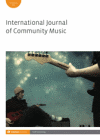
International Journal of Community Music
Innovating Research for a Harmonious TomorrowThe International Journal of Community Music, published by INTELLECT LTD, stands at the forefront of interdisciplinary research in the field of community music. With an ISSN of 1752-6299 and an E-ISSN of 1752-6302, this esteemed journal has made significant contributions to the understanding of music as a vehicle for social inclusion, cultural expression, and community building since its inception in 2008. Operating from the United Kingdom, the journal is well-regarded within the academic community, boasting a Q1 ranking in Music and a commendable 85th percentile position in the Scopus Arts and Humanities category. The journal provides a platform for innovative research, case studies, and critical discussions that explore the dynamic relationships between music and community engagement. With a focus on fostering new knowledge and practices, the International Journal of Community Music serves as an essential resource for researchers, practitioners, and students who are passionate about the transformative power of music in society.
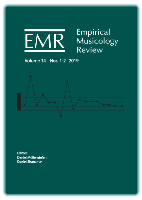
Empirical Musicology Review
Fostering Innovative Dialogues in Music Through Empirical EvidenceEmpirical Musicology Review is a pioneering journal in the field of musicology, published by the Ohio State University School of Music. Established as an open access journal since 2006, it aims to foster interdisciplinary research by providing a platform for scholars to disseminate empirical studies and analyses related to music. With ISSN 1559-5749, this journal plays a crucial role in expanding the understanding of music through methodological rigor and innovative practices, catering to researchers, professionals, and students alike. By promoting the accessibility of high-quality research, Empirical Musicology Review significantly contributes to the evolving landscape of music studies and enhances the global dialogue surrounding music's theoretical and practical dimensions. The journal's commitment to open access ensures that its valuable insights reach a broad audience, encouraging further exploration and collaboration within the musicology community.
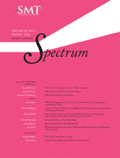
MUSIC THEORY SPECTRUM
Unveiling the Spectrum of Musical UnderstandingMUSIC THEORY SPECTRUM, published by Oxford University Press, serves as a premier journal in the field of music theory, recognized for its significant contributions and scholarship since its inception. With an ISSN of 0195-6167 and E-ISSN 1533-8339, this journal has established a distinguished position within the academic community, boasting an impressive Q1 status in the Music category for 2023 and ranking #17 out of 180 in Scopus for Arts and Humanities, Music, placing it within the 90th percentile. Despite its non-open access format, MUSIC THEORY SPECTRUM offers a wealth of research articles, reviews, and theoretical discussions aimed at both seasoned scholars and students alike. It spans from 1981 until present, fostering critical engagement and advancing understanding within the discipline. Researchers and music theorists will find this journal an invaluable resource for the latest insights and methodologies in music theory.
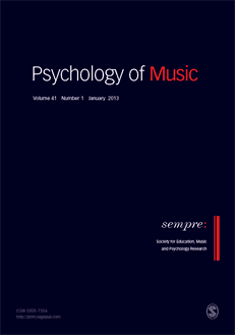
Psychology of Music
Elevating the Dialogue on Music's Role in Cognitive and Social RealmsPsychology of Music is a prominent academic journal published by SAGE Publications Inc, focusing on the interdisciplinary field that bridges psychological principles and musical expression. Established in 1973, this esteemed journal plays a crucial role in advancing understanding of how music affects emotions, cognition, and social interactions, thus catering to a diverse audience of researchers, educators, and practitioners in both psychology and music. With an impressive impact factor that places it in the Q1 category for Music and Q2 for Psychology (miscellaneous) in 2023, this journal ranks 3rd out of 180 in Arts and Humanities – Music, and 19th out of 97 in Psychology (miscellaneous) according to Scopus metrics, affirming its authoritative contribution to the field. The Psychology of Music is essential for those looking to explore cutting-edge research, methodologies, and applications, providing rich insights and fostering discussions that reach into music therapy, education, and psychological wellness. Although it is not an open-access journal, its high-quality peer-reviewed articles are pivotal for anyone dedicated to the intricate relationship between music and the mind, making it a must-read for professionals and students alike.

MUSICAL TIMES
Delving Deep into the Art and Science of MusicMUSICAL TIMES is a distinguished journal dedicated to the exploration and dissemination of scholarly works in the realm of music, serving as an essential resource for researchers, professionals, and students alike. Published by MUSICAL TIMES PUBLICATIONS LTD, this journal has built a robust reputation within the arts and humanities, specifically focusing on music studies, with an impactful reach indicated by its Scopus ranking at #73 out of 106 in the field. Though access to this journal is not open, its curated content, which spans various facets of musicology and contemporary music discourse, enriches the academic community by encouraging insightful discussions and critical analyses. With its historical roots tracing back to its inception, MUSICAL TIMES aims to foster a deeper understanding of music's cultural, social, and artistic dimensions, making it a valued publication for those engaged in the scholarly pursuit of music.

Musicologist
Exploring the Depths of Music ScholarshipMusicologist is a premier academic journal dedicated to the exploration and analysis of music theory, history, and practice, published by the esteemed Trabzon University State Conservatory in Turkey. With an ISSN of 2618-5652, this journal has been a vital platform for scholars since its inception in 2019, reflecting a commitment to fostering innovative research in the field of music. Recognized for its quality, the journal currently holds a Q2 ranking in the music category for 2023, placing it within the top segments of its discipline, as evidenced by its position at #72 out of 180 in the Scopus rankings, representing the 60th percentile. Although the journal employs a traditional publication model, it serves as a crucial repository for contemporary musicological discourse, aiming to advance knowledge and understanding within a vibrant academic community. Musicologist is not only a resource for seasoned researchers but also an invaluable tool for students and professionals alike, nurturing a comprehensive appreciation of music as an art form and scholarly pursuit.
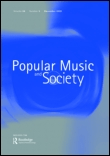
POPULAR MUSIC AND SOCIETY
Revealing the Dialogues Between Music and CulturePOPULAR MUSIC AND SOCIETY, published by Taylor & Francis Ltd, is a leading interdisciplinary journal that explores the intricate relationships between popular music and social dynamics. With an ISSN of 0300-7766 and E-ISSN 1740-1712, this esteemed journal has established a significant presence in the academic community since its inception, covering a broad scope from 1971 and continuing to provide critical insights into contemporary issues in popular music research. Currently classified as Q1 in both Cultural Studies and Music for 2023, it ranks impressively within the top quartile of its fields, showcasing its scholarly impact and relevance. With a Scopus ranking of #42 in Music and #305 in Cultural Studies, POPULAR MUSIC AND SOCIETY serves as an essential platform for researchers, educators, and students to engage with innovative theories and analyses that reflect the evolving cultural landscape. The journal does not currently offer Open Access options, ensuring a focused readership that values in-depth scholarly work. Nestled in the United Kingdom, this publication continues to shape discussions around music's role in society, making it a pivotal resource for those dedicated to understanding the cultural significance of popular music.
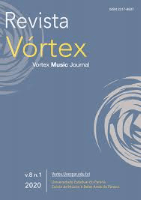
Revista Vortex-Vortex Music Journal
Exploring the Soundscape of Scholarly Music ResearchRevista Vortex-Vortex Music Journal is a premier open-access journal published by the Universidade Estadual do Paraná, specifically through its esteemed Escola de Música & Belas Artes do Paraná. With its ISSN 2317-9937, this journal serves as a critical platform for the dissemination of research and discourse in the field of musicology, music education, and the performing arts. Established in 2014, the journal has been dedicated to fostering scholarly exchange among researchers, practitioners, and students, emphasizing the significance of music as a cultural artifact and academic pursuit. As an open-access publication, it ensures that findings are readily available to a global audience, promoting inclusivity and engagement in the field. Located in Curitiba, Brazil, Revista Vortex invites contributions that explore a diverse range of topics and methodologies, seeking to enhance the understanding of music in contemporary society.

INTERNATIONAL REVIEW OF THE AESTHETICS AND SOCIOLOGY OF MUSIC
Innovating Dialogues in Music Aesthetics and SociologyThe INTERNATIONAL REVIEW OF THE AESTHETICS AND SOCIOLOGY OF MUSIC, published by the Croatian Musicological Society, is a pivotal scholarly journal dedicated to the intricate intersection of music, aesthetics, and sociology. With a special focus on exploring the cultural and social dimensions of music, this journal serves as a platform for researchers, professionals, and students alike to disseminate innovative ideas and transformative research. Although it operates under a traditional access model, the journal's impact within the field of music studies is underscored by its commendable Scopus ranking in the Q3 category and its established history from 2009 to 2016, with a renewed focus from 2018 to 2023. With an ISSN of 0351-5796, it continues to shape academic discourse with its insightful contributions and is essential for those aiming to engage deeply with the evolving dynamics of music in society.